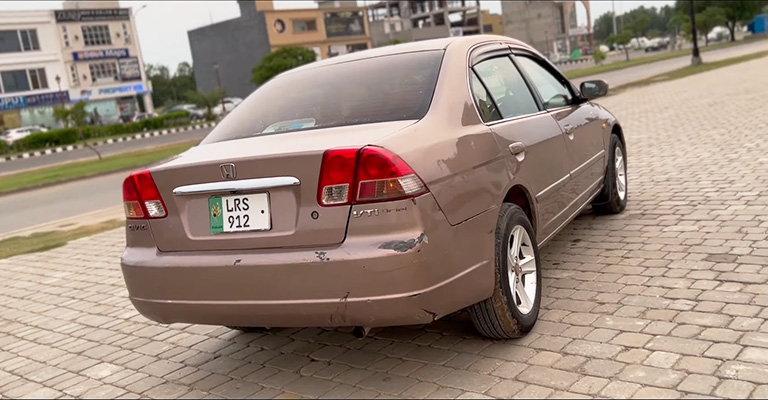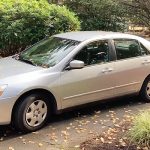The 2003 Honda Civic is a compact car that was highly popular among consumers due to its fuel efficiency, reliability, and overall performance. However, like any vehicle, the 2003 Honda Civic is not immune to problems.
Some common issues reported by owners of the 2003 Honda Civic include transmission problems, engine issues, and problems with the suspension and steering.
It’s important for owners of this model to be aware of these potential problems and to have their car regularly serviced in order to catch and fix any issues before they become more serious.
In this article, we’ll take a closer look at some of the common problems reported by owners of the 2003 Honda Civic.

2003 Honda Civic Problems
1. Airbag Light Due to Failed Occupant Position Sensor
This issue is caused by a faulty sensor that is responsible for detecting the position of the occupant in the front seat. If this sensor fails, the airbag light on the dashboard will turn on, indicating that there is a problem with the airbag system.
This can be a safety concern, as the airbags may not deploy properly in the event of an accident.
2. Bad Engine Mounts May Cause Vibration, Roughness, and Rattle
Engine mounts are responsible for securing the engine to the frame of the car. If these mounts become worn or damaged, it can cause vibration, roughness, and a rattle when driving. This can be caused by normal wear and tear, but it can also be caused by other factors such as poor quality or defective engine mounts.
3. Power Window Switch May Fail
The power window switch is responsible for controlling the movement of the windows in the car. If this switch fails, it can cause the windows to become stuck in the up or down position, or they may not move at all. This can be a frustrating issue, as it can prevent you from using the windows in your car.
4. Hood Release Cable May Break at Handle
The hood release cable is responsible for allowing you to open the hood of the car. If this cable breaks at the handle, it can make it difficult or impossible to open the hood.
This can be a problem if you need to access the engine compartment for any reason, such as to check the oil or add washer fluid.
5. Possible Shift Control Solenoid Fault
The shift control solenoid is responsible for controlling the shifting of the gears in the transmission. If this solenoid fails, it can cause problems with the shifting of the gears. This can manifest as difficulty shifting into certain gears, or the car may not shift into gear at all.
This can be a serious problem, as it can prevent you from driving the car.
6. Wipers Won’t Park Due to Windshield Wiper Motor Failure
The windshield wiper motor is responsible for moving the wipers back and forth across the windshield. If this motor fails, it can cause the wipers to become stuck in one position, or they may not move at all.
This can be a problem if you need to use the wipers in wet or snowy conditions, as it can make it difficult to see through the windshield.
7. Low rumbling sound when in Reverse = Bad Engine Mounts
As mentioned earlier, engine mounts are responsible for securing the engine to the frame of the car. If these mounts become worn or damaged, it can cause a low rumbling sound when the car is put into reverse.
This can be caused by normal wear and tear, but it can also be caused by other factors such as poor quality or defective engine mounts.
8. Door Lock May be Sticky and Not Work Due to Worn Door Lock Tumblers
The door lock tumblers are responsible for allowing the door to lock and unlock. If these tumblers become worn, they can become sticky and may not work properly.
This can make it difficult to lock or unlock the doors, which can be frustrating and potentially unsafe if you are unable to secure the car.
9. Problem with the IMA Light on
The IMA light, or the Integrated Motor Assist light, is a warning light that is displayed on the dashboard of the car. If this light comes on, it could indicate a problem with the IMA system, which is responsible for providing additional power to the engine.
If this light comes on, it’s important to have the car checked by a mechanic as soon as possible to diagnose and fix the problem.
10. Cracked Exhaust Manifold/Catalytic Converter
The exhaust manifold is responsible for collecting and directing the exhaust gases from the engine to the exhaust pipe. If this manifold becomes cracked, it can cause exhaust gases to leak out. This can be a problem not only for the performance of the car but also for the environment.
The catalytic converter is a part of the exhaust system that helps to reduce the amount of harmful emissions produced by the car. If this converter becomes damaged, it can also cause exhaust issues and potentially contribute to environmental problems.
11. Warped Front Brake Rotors May Cause Vibration When Braking
The brake rotors are an important part of the brake system. They are responsible for providing a surface for the brake pads to press against, which helps to stop the car. If the front brake rotors become warped, it can cause a vibration when braking.
This can be caused by normal wear and tear, but it can also be caused by other factors such as excessive heat or improper brake pad selection.
12. Front Compliance Bushings May Crack
The compliance bushings are responsible for allowing the suspension to move and absorb shock. If these bushings crack, it can cause problems with the suspension and handling of the car. This can manifest as a rough ride or difficulty steering.
13. PCM Software Update to Correct False Oxygen Sensor Code
The PCM, or powertrain control module, is responsible for controlling various systems in the car, including the oxygen sensor. If there is a problem with the oxygen sensor, it can cause a false code to be displayed. In this case, a software update may be required to correct the issue.
14. Faulty head gasket may cause oil and coolant leaks
The head gasket is responsible for sealing the engine block and the cylinder head. If this gasket becomes damaged or fails, it can cause oil and coolant to leak. This can be a serious problem, as it can cause engine damage and overheating.
15. Coolant Leaking and Engine Overheating
If the coolant is leaking, it can cause the engine to overheat. This can be a serious problem, as it can cause damage to the engine and potentially result in a breakdown. Coolant leaks can be caused by a variety of factors, such as a faulty radiator, a leaking hose, or a problem with the water pump.
It’s important to have the car checked by a mechanic if you suspect a coolant leak or if the engine is overheating.
Possible Solution
| Problem | Possible Solution |
| Airbag Light Due to Failed Occupant Position Sensor | Replace the faulty sensor |
| Bad Engine Mounts May Cause Vibration, Roughness, and Rattle | Replace the worn or damaged engine mounts |
| Power Window Switch May Fail | Replace the faulty power window switch |
| Hood Release Cable May Break at Handle | Replace the broken hood release cable |
| Possible Shift Control Solenoid Fault | Replace the faulty shift control solenoid |
| Wipers Won’t Park Due to Windshield Wiper Motor Failure | Replace the faulty windshield wiper motor |
| Low rumbling sound when in Reverse = Bad Engine Mounts | Replace the worn or damaged engine mounts |
| Door Lock May be Sticky and Not Work Due to Worn Door Lock Tumblers | Replace the worn door lock tumblers |
| Problem with the IMA Light on | Have the car checked by a mechanic to diagnose and fix the problem with the IMA system |
| Cracked Exhaust Manifold/Catalytic Converter | Replace the cracked exhaust manifold or catalytic converter |
| Warped Front Brake Rotors May Cause Vibration When Braking | Replace the warped front brake rotors |
| Front Compliance Bushings May Crack | Replace the cracked front compliance bushings |
| PCM Software Update to Correct False Oxygen Sensor Code | Perform a software update on the PCM to correct the false oxygen sensor code |
| Faulty head gasket may cause oil and coolant leaks | Replace the faulty head gasket |
| Coolant Leaking and Engine Overheating | Repair or replace the faulty component causing the coolant leak (e.g. radiator, hose, water pump) and refill |
2003 Honda Civic Recalls
| Recall Number | Problem | Affected Models |
| 19V501000 | Newly Replaced Passenger Air Bag Inflator Ruptures During Deployment Spraying Metal Fragments | 10 models |
| 19V499000 | Newly Replaced Driver’s Air Bag Inflator Ruptures During Deployment Spraying Metal Fragments | 10 models |
| 19V182000 | Driver’s Frontal Air Bag Inflator Ruptures During Deployment Spraying Metal Fragments | 14 models |
| 18V268000 | Front Passenger Air Bag Inflator Potentially Installed Improperly During Replacement | 10 models |
| 15V370000 | Front Passenger Air Bag Defective | 7 models |
| 15V320000 | Driver’s Front Air Bag Defective | 10 models |
| 14V700000 | Front Airbag Inflator Module | 9 models |
| 14V353000 | Front Airbag Inflator Module | 9 models |
| 10V364000 | Honda Recalls 2003-2004 Vehicles Due to Defective Ignition Switch | 3 models |
| 12V136000 | Low Beam Headlights May Fail | 3 models |
| 07V512000 | Honda Recalls Certain 1998-2007 Civic CNG Vehicles to Add Insulation for the CNG Tank | 1 model |
Recall 19V501000:
This recall affects certain 2003-2007 Honda Civic models that have had their passenger airbag inflator replaced. It has been reported that these newly replaced inflators may rupture during deployment, spraying metal fragments.
This can be a serious safety concern, as the metal fragments can strike the occupants of the car, potentially causing injury or death.
Recall 19V499000:
This recall is similar to the first, but it affects the driver’s airbag inflator instead of the passenger’s. The issue is the same – the newly replaced inflator may rupture during deployment, spraying metal fragments.
Recall 19V182000:
This recall affects certain 2003-2007 Honda Civic models that have the original driver’s frontal airbag inflator. It has been reported that these inflators may rupture during deployment, spraying metal fragments.
This can be a serious safety concern, as the metal fragments can strike the driver or other occupants of the car, potentially causing injury or death.
Recall 18V268000:
This recall affects certain 2003-2007 Honda Civic models that have had the front passenger airbag inflator replaced. It has been reported that these inflators may have been installed improperly during the replacement process.
This can cause the airbag to deploy improperly in the event of a crash, increasing the risk of injury.
Recall 15V370000:
This recall affects certain 2003-2005 Honda Civic models that have the original front passenger airbag. It has been reported that the inflator in these airbags may rupture during deployment, spraying metal fragments.
This can be a serious safety concern, as the metal fragments can strike the passengers or other occupants of the car, potentially causing injury or death.
Recall 15V320000:
This recall is similar to the fifth, but it affects the driver’s front airbag instead of the passenger’s. The issue is the same – the inflator in the airbag may rupture during deployment, spraying metal fragments.
Recall 14V700000:
This recall affects certain 2003-2007 Honda Civic models that have the original front airbag inflator. It has been reported that these inflators may rupture during deployment
Problems and Complaints Sources
https://repairpal.com/2003-honda-civic/problems
https://www.carcomplaints.com/Honda/Civic/2003/
All Honda Civic years we talked –




